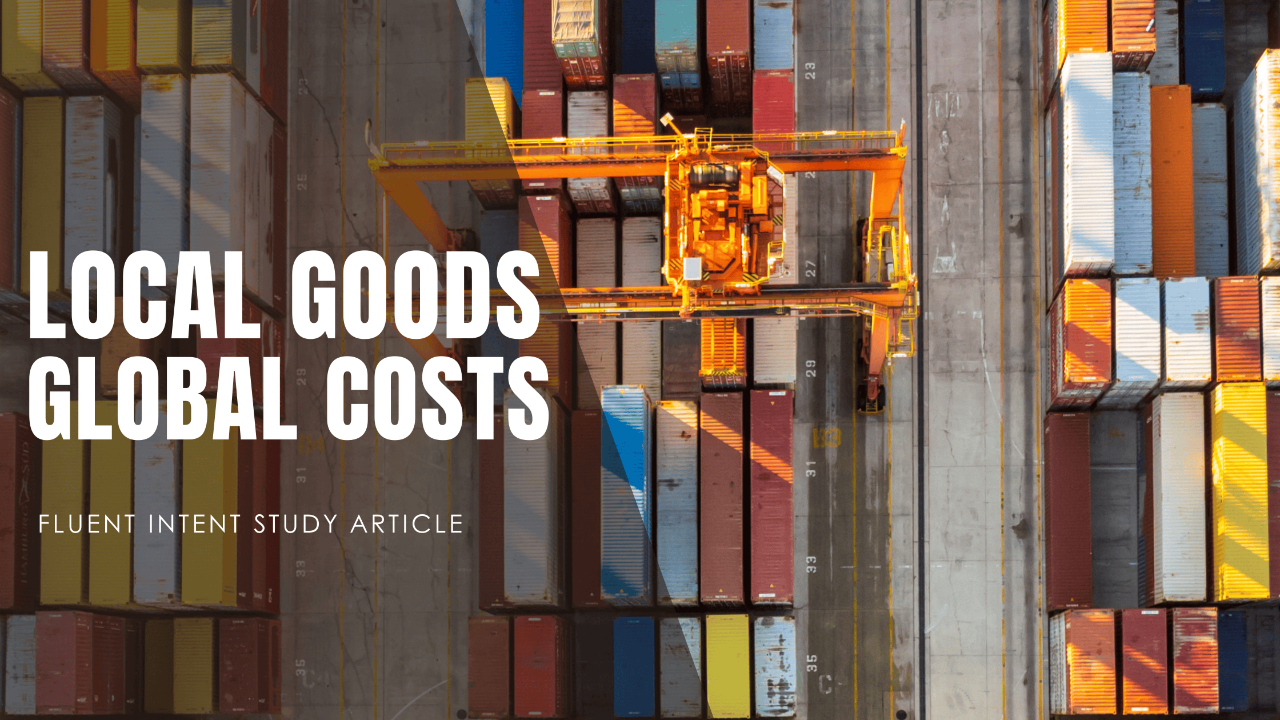English Study Article | Local Goods, Global Costs
Oct 17, 2025
Welcome to Fluent Intent's study articles! This month, we're exploring "Principles" in business, economics, and finance, drawing inspiration from Ray Dalio's Principles and Saifedean Ammous's Principles of Economics.
Each day, you'll discover a new piece connecting timeless ideas to your world—perfect for sharpening both your English and your business insights.
A Note on Today's Scenario
This article presents a realistic 2025 scenario designed to illustrate key business vocabulary in action. While fictional, it mirrors real challenges you've likely encountered in business or the news. As you read, consider: Where have you seen similar supply chain decisions unfold?
Power Up Your Business Vocab
Opportunity Cost /ˌɑː.pərˈtuː.nɪ.ti kɔːst/
Definition: The value of what you give up when choosing one option over another
In action: "The opportunity cost of training was missing out on a major sales quarter."
Sourcing /ˈsɔːr.sɪŋ/
Definition: The process of finding and obtaining goods, services, or suppliers
In action: "Local sourcing cut shipping delays but significantly increased production costs."
Premium /ˈpriː.mi.əm/
Definition: An additional cost paid for higher quality, speed, or reliability
In action: "Customers were willing to pay a premium for guaranteed delivery dates."
Weigh /weɪ/
Definition: To carefully consider and compare different options or factors
In action: "The board spent hours weighing the benefits against potential risks."
Miss the boat (idiom)
Definition: To lose an opportunity by acting too late or being too slow
In action: "We nearly missed the boat on that partnership by overthinking the details."
Shift /ʃɪft/
Definition: A significant change in strategy, direction, or approach
In action: "The company's shift toward sustainability attracted younger consumers."
The Story: When Global Supply Chains Break Down
Imagine this scenario: It's spring 2025, and global shipping is in chaos. Massive container vessels sit idle at Asian ports, victims of labor strikes and infrastructure breakdowns. For retailers worldwide, this isn't just an inconvenience—it's an existential crisis.
Enter UrbanMart, a mid-sized clothing retailer facing empty shelves and angry customers. Their usual sourcing strategy relied heavily on low-cost Asian manufacturers, but now those goods are trapped in a logistical nightmare. CEO Maria Rodriguez faces a brutal choice: stick with cheap imports and risk missing the crucial summer season, or make a dramatic shift to local suppliers.
"We can't afford to miss the boat on summer sales," Rodriguez tells her executive team. "The opportunity cost of waiting could destroy our entire year."
The numbers are stark. Local fabrics carry a 40% premium over Asian imports, but delivery times drop from months to mere days. Rodriguez must weigh profitability against speed, certainty against cost. Her competitors, still tied to overseas supply chains, watch nervously as shipping costs skyrocket and delivery dates become fantasies.
UrbanMart's decision reveals something fundamental about modern commerce: every choice sacrifices something valuable. Choose local suppliers and sacrifice profit margins. Choose to wait for cheaper goods and sacrifice market timing. There's no perfect solution, only trade-offs.
This supply chain crisis isn't just UrbanMart's problem—it's reshaping entire industries. Companies are discovering that the cheapest option often carries hidden vulnerabilities. When global systems fail, local relationships become lifelines.
The story raises questions that extend far beyond retail: In your career, when have you faced similar either-or decisions? What opportunity costs have you accepted to gain speed, quality, or certainty?
Think About It
For Your Career: What trade-offs have you made between cost and speed—whether in projects, training, or strategic decisions? How did you weigh the options?
For Your Learning: When studying business English, do you prioritize vocabulary breadth or communication fluency? What's your opportunity cost?
For Your Industry: How might supply chain vulnerabilities in your field force similar local versus global sourcing decisions? What would you prioritize?
Dive Deeper
-
The Supply Chain: From Raw Materials to Order Fulfillment - Investopedia
-
How Supply Chain Delays Affect Global Household Goods - Institute of Risk Management